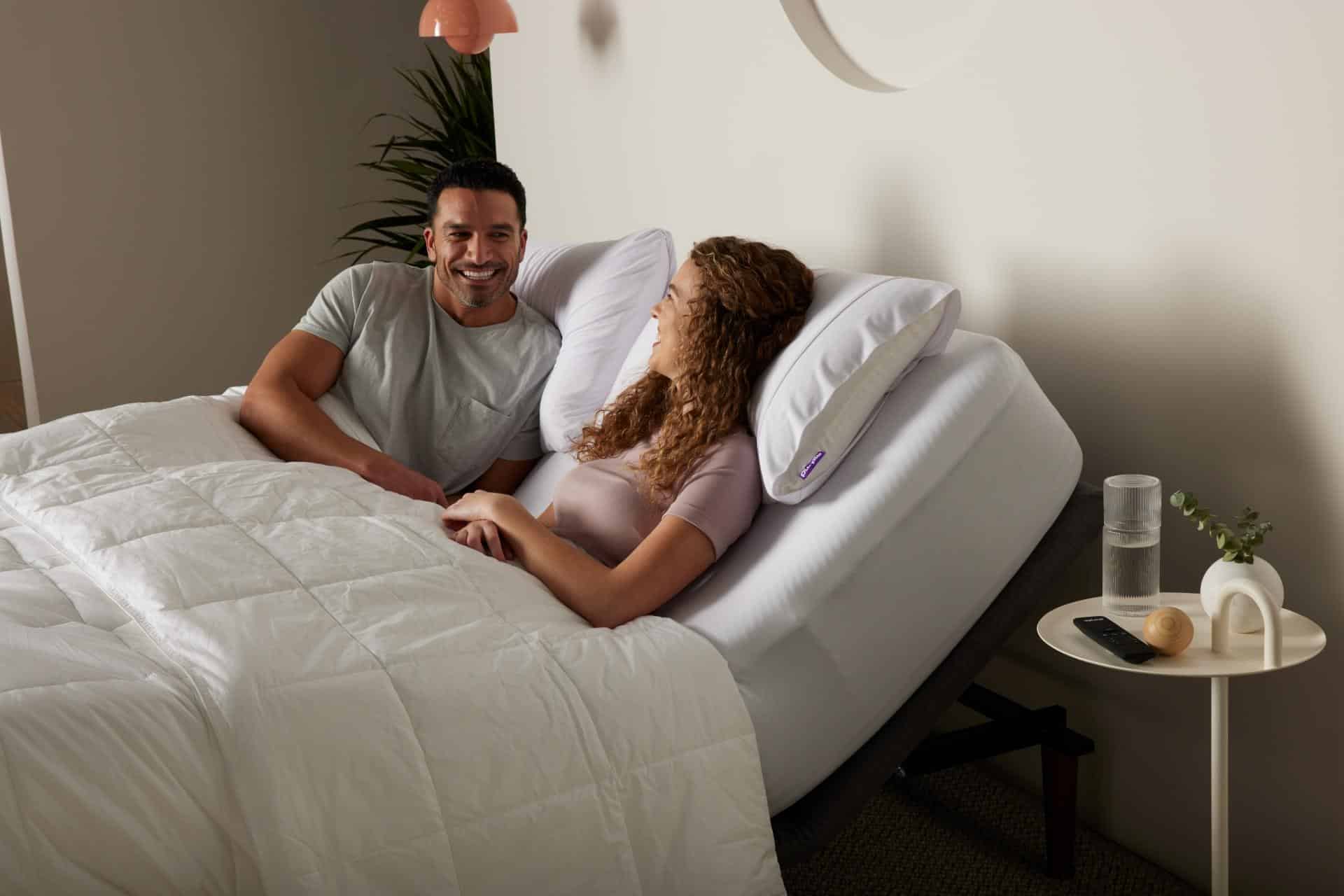Many Americans struggle with chronic snoring, and some even have a more serious condition called sleep apnea. Snoring not only disrupts the sleep of those around you but can also affect your own sleep quality, leaving you tired in the morning.
The solution is simple: get an adjustable bed. It can help reduce snoring and enhance your overall sleep experience.
Table of Contents
The Causes of Snoring
Men are more likely to report snoring than women, with around 42% of men compared to 31% of women, according to the National Sleep Foundation. Keep in mind that these numbers are based on self-reported data and are estimates.
Several factors can contribute to snoring, and some may be addressed with lifestyle changes, while others may require professional advice. Here are common reasons for snoring:
-
Extra weight: Carrying excess weight around the neck can narrow the airway, leading to increased snoring.
-
Weakened throat and tongue muscles: Aging, alcohol, or certain medications can contribute to muscle slackening, worsening snoring.
-
Pregnancy: Hormonal changes during pregnancy can cause nasal tissue to swell, leading to congestion and snoring, especially in the last month.
-
Structural issues: An irregular nasal septum or nostril blockages can contribute to snoring.
-
Long uvula or palate: Excessive length in these areas may disrupt the nose-throat connection, making breathing difficult.
-
Back-sleeping: Sleeping on your back may cause the tongue to slip backward, blocking the airway. Changing sleep positions can sometimes help, but not everyone snores for this reason.
What Are Adjustable Beds?
Adjustable beds are motorized bed frames that can lift the head and/or feet areas of the mattress, allowing you to customize your sleeping position. Initially designed for hospitals to aid patient recovery, these beds have become popular for home use.
In the 1970s, adjustable beds moved from hospitals to bedrooms, offering a versatile space for activities like watching TV or reading. In the 1990s, they became more affordable with premium features, making them widely accessible. Today, adjustable beds are not just a luxury but also promote health and wellness, enhancing comfort and aiding in physical recovery.
One key advantage is their ability to address sleep disruptions like snoring and sleep apnea, making them appealing to mattress shoppers. As these beds continue to evolve with diverse features, they remain a versatile and user-friendly solution for those seeking a better and personalized sleep environment.
How Do Adjustable Beds Help Reducing Snoring?
An adjustable bed can tackle many of the causes of snoring. Here’s how:
1. Elevate your head
Raise your head while sleeping to improve breathing. Adjusting your bed to lift your head reduces pressure on airways and nasal passages, minimizing blockage and discomfort. It helps prevent tongue slippage and throat blockage, especially if you sleep with your mouth open.
Elevating your head is effective—67% of snorers saw a significant reduction in symptoms in a clinical trial. Sleeping with a raised head promotes better sinus drainage, keeping nasal airways open during sleep.
2. Lessen the need for pillows
Avoid using multiple pillows for snoring if you sleep on your back. Constant pillow adjustments disrupt sleep and may lead to neck and back pain.
An adjustable bed eliminates the need for multiple pillows and provides stable elevation, preventing disturbances and ensuring a good night’s sleep. Losing pillow elevation during the night can also reintroduce snoring or sleep apnea.
You may also want to check out some anti-snoring devices or anti-snoring mouthpieces.
Learn more: 8 Best Pillows for Snoring
3. Take advantage of zero-gravity sleep
Try zero-gravity sleep by reclining at a 120-degree angle with slightly elevated legs. This position aligns the spine, reduces lower back and hip strain, improves blood circulation, and lowers the risk of sleep apnea and acid reflux.
Zero gravity may not address all snoring causes, but it can be effective for specific issues. If your snoring is due to tongue position or throat pressure, this position can help by angling your head at 30 to 45 degrees, relieving pressure on the throat, opening airways, and minimizing snoring.
4. Let you sleep on your back
To reduce snoring, sleep on your back. Side sleeping is recommended, but it can be uncomfortable for those with back and hip issues.
An adjustable mattress lets you sleep comfortably elevated on your back, addressing snoring causes while providing comfort.
Learn more: What’s the Best Sleep Position to Reduce Snoring?
5. Sleep on your side comfortably
Adjustable beds aren’t just for back sleepers; they’re great for side sleepers too! On a flat bed, side sleepers may feel pressure on shoulders, neck, or hips, leading to health issues.
Adjustable beds contour to your body, promoting natural spine alignment and relieving pressure from hips and shoulders.
Elevating your upper body and raising knees reduce pressure, making side sleeping comfortable.
Small reclined adjustments to the head alleviate joint pressure and enhance blood circulation.
Learn more: How to Stop Snoring: 15 Best Remedies
Which Adjustable Bed Is Best For Snoring?

For a snore-free sleep, the top choice is Purple’s Ascent Adjustable Base. It offers customizable support at an affordable price, featuring Zero-Gravity positions for near-weightless sleep.
The wireless remote allows easy height adjustments, accommodating various bed frames and mattresses, including memory foams and hybrids. It comes with a 10-year warranty for added peace of mind.
Things to Consider When Choosing an Adjustable Bed
Consider these factors when choosing an adjustable bed:
-
Budget: Adjustable beds are pricier, but the investment can pay off over 20 years.
-
Compatibility: Ensure your existing bed components, especially platforms, align with an adjustable bed.
-
Mattress Compatibility: Opt for mattresses like latex or memory foam that work well with adjustable beds, avoiding damage risks.
-
Setup: The base can be heavy, so enlist help for transportation and setup, especially if you’re not experienced in furniture assembly.